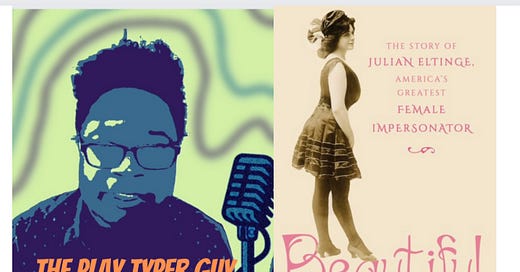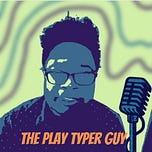Friend of the podcast Dr. Andrew Erdman joins us to discuss his new book Beautiful: The Story of Julian Eltinge, America’s Greatest Female Impersonator. It’s a compelling read about a major figure on stage and screen who was sadly forgotten although his legacy endures today. I enjoyed chatting with Andy about Eltinge’s career and this fascinating period in pop culture history.
Beautiful comes out on May 17. You can order it here and of course on Amazon.
Download the podcast above and/or watch the YouTube video below. As always, I’d appreciate it if my Substack subscribers/followers also subscribed to my YouTube channel. It’s called synergy!
Transcribed excerpts from our conversation:
ANDY ERDMAN: I had encountered this guy, Julian Elting, when I wrote my last book, Queen of Vaudeville, which is about Eva Tanguay, who was another person who was a big … the term I’ve heard is “forgot buster.” She was sort of a huge star, huge vaudeville star, kind of a Madonna of her day, and she had been involved in this kind of shenanigan faux engagement with this female impersonator, Julian Elting, and really sent up the whole concept of marriage.
And I thought, he’s an interesting guy. And also given what’s going on in the culture wars and … I’m similarly interested in the cultural and popular history of that era, because it’s also the rise of like modern psychology and modern sexology. I thought, well, let me poke around. And nobody had written, there was a lot of interest about him, particularly in, you know, sort of the LGBTQ community and sort of sphere, but nobody had really written an in-depth or scholarly biography of him.
And that’s how I became, you know, I sort of dove into it. And the more I dove in, the more the story sort of revealed itself. And then just with, you know, right-wing politics being what it is, it just seemed to amplify, leaven the whole tale even further, you know.
SER: I was actually watching an American Masters PBS video where … they’d used the [label] drag queen. And, if you read the book, that’s not quite your take.
ANDY: Yeah, but by necessity and somewhat as a kind of writerly tool, I described him as a female impersonator, which he was, although he didn’t like that term. And that necessarily, you know, is an umbrella that covers a lot of things that don’t always fit together. At the time that he was really rising to prominence and really creating this fascination with female impersonation in the early 1900s, there was a sub-genre of men dressing very precisely and very erotically like women, both professional performers like Julian Elting and also college men, you know, these college groups, they took it very seriously. Sometimes that got the professors and administrators a little worried.
So there was that branch that partly owed its, that partly had a lineage that came from blackface minstrelsy where men played these sort of tragic female singers who were very popular and very beautiful and kind of erotic, as opposed to more campy draggy cartoonish that was kind of another strain of female impersonation and there were there were impersonators who were popular in that regard too they came under heavier fire particularly as the at the end of the 20s and early 30s when you had this reactionism that’s not unlike what’s going on today but also Stephen, I was reading your article on the reaction to Romeo and Juliet in the West End … And yeah, as you point out, like in the Shakespearean era and even beyond, men and teenage boys played women’s roles very, for lack of a better word, faithfully.
Racists Absolutely Certain Romeo And Juliet Were Very Real, Very White People
The upcoming West End production of Romeo & Juliet has predictably triggered racists with its perfectly normal casting. The actors playing the titular characters aren’t AI or anything. Romeo is the MCU’s Spider-Man Tom Holland and Juliet is Francesca Amewaduh-Rivers (
So, Edward Kiniston was this incredibly famous impersonator. And for a while, women, as many people will know, women were not allowed on the British stage until after the Restoration in the 1660s.And so at that time, you had these men who were brilliant and precise female impersonators, and then these brilliant actresses, and they were like competing. And, you know, Samuel Pepys, who was the kind of, this is back when you could be a diarist for a living, apparently, Samuel Pepys, you know said like i saw them both and um i don't know they're both great so but it’s a long history and it’s complicated.
SER: I guess now we talk about this because yeah, like Juliet, you talk about Juliet or Lady Macbeth, these are amazing roles that men or young men originated in Shakespeare time. I mean, I joked that, well, the nurse, I could see the nurse in Romeo and Juliet being a drag performance because she’s very over the top and whatever a lot of what we associate with drag and what you were differentiating at the time it would have been the case, but no I mean this is meant you're meant to believe that balcony scene. It’s not supposed to be like a giggle or a Bugs Bunny cartoon. It’s supposed to be and again, female illusionism, female impersonation. [You’re supposed to] believe that what you’re seeing is the case. And, you know, the framing that the PBS documentary made it seem as if there was Julian and [that was] sort of the first step that that to which became drag. But again, as you described in the book, that was also occurring simultaneously.
ANDY: And Stephen, just as has also come out, this is not my original scholarship, but I do mention it in the book. If we kind of trace back the modern drag queen lineage, a man named Dorsey Swan, who was a Black artist living in, I think, Maryland. I talk about this in the book. There’s some good articles on it is sort of credited, you know, now scholars have rediscovered inventing a sort of more, for lack of a better word, politically cartoonish, but also very compelling drag. And, you know, you have to situate something like drag queen. What does it mean? That’s a loaded term. What do we think about sexuality, gender, binarity, you know, and all that’s changing as well.
SER: Years ago, I was working at front of house at Victor/Victoria, the Broadway production with Julie Andrews. And, you know, if you've seen the film or seen that production, it's set sort of in a period where there were still female in person, especially that was still a very popular form of entertainment. And it’s meant to be, again, for lack of a word, faithfully. So that’s the twist. And so that’s how Julie Andrews played it. And then … towards sort of the end of her run, she took some time off and Liza Minnelli came in to keep the show running. And of course I was, the young me was delighted. Oh my God, Liza Minnelli! And it was great to see her, lovely lady. She had spoken in passing to me, very nice. But when she transforms on stage and now she’s Liza Minnelli, you can’t help but think, oh, but now it’s a drag show. In a great way, if you like drag, but it’s totally a different thing. And that’s just what popped in my head when I was reading your book … oh, right, like Julie’s [performance was] very faithful to that form. And Liza’s doing what anyone would have paid to see, but that’s a different performance entirely.
ANDY: And there are different pleasures associated with each. And each one sort of brings up different anxieties around gender. As you know from the book, Julian Elting really reinforced the wall between on stage, I dress up perfectly, but then I’m totally different off stage. And then in a way, he’s doing male drag in his real life. He’s pretending to be a boxing roughneck who likes smoking cigars and talking about stocks. Apparently, if you talk about the stock market, you are incredibly heteronormative, which may be the case or may have been the case.















Share this post